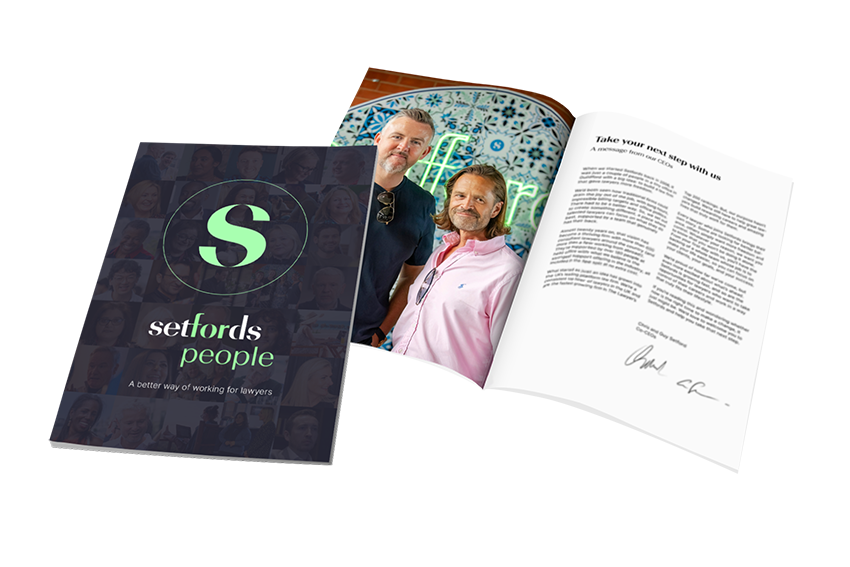‘Imposter syndrome’ is a term thrown around a lot within the working world. It can seemingly affect anyone, regardless of gender, age, or position. Indeed, google the words ‘imposter syndrome’, and countless stories from some of the world’s most accomplished people will appear, from Albert Einstein to Michelle Obama.
Imposter syndrome typically refers to feelings of self-doubt in your abilities at work. Those experiencing it may feel like a fraud and worry that others in the workplace will discover that they do not belong there. This can happen even if they are more than adequately qualified and experienced for their role.
It’s prolific in the legal industry, amongst newly-qualified lawyers and seasoned solicitors alike. Add to this the gruelling workload, long hours, and impossible targets, and lawyers can quickly be left feeling burnt out and tired of the profession in many ways.
But what is the solution to this problem? Why are rates of imposter syndrome so high? In an article for The Financial Times, Viv Groskop recalls asking a room of 600 women if they had ever felt imposter syndrome, and the majority raised their hands. She suggests, “I’m no doctor but it seems to me that if 90 per cent of people or more report that they are suffering from a condition, then it is very likely the disease known as the human condition.”
It seems as though imposter syndrome affects almost everybody. So, does it even need a label? When encountering a new challenge, it is natural for most people to feel nervous, unprepared, and underqualified. In law, the impossibly high targets that make it difficult for anyone to feel as though they’re actually doing ‘well’ only exacerbate this. The legal sector needs a shake-up in this regard, and consultancy offers a better way forward. At Setfords, our consultancy model means that lawyers can work when, where, and however they want. We have no set targets so lawyers have complete control over what success means to them.
Self-doubt
Many lawyers feel that they would like to make the move to become consultant lawyers but lack feel held back by imposter syndrome. They doubt their ability to generate work or to cope without sitting in an office surrounded by other lawyers for support.
Christina Coleman, a consultant Licenced Conveyancer at Setfords, says:
“Making a significant change can be daunting. My biggest fear was that no one would use me, and I would be a complete failure! I knew it wouldn’t be easy in the beginning, especially starting from scratch.”
However, she didn’t let this fear stop her, and now enjoys her career. She says: “The thing I am enjoying the most is the freedom it gives me and the control I have over my own files. If I could offer someone who is considering consultancy some advice, it would be: don’t think about it any longer – just do it! I certainly have no regrets!”
Sarah Edwards, a consultant residential property solicitor, echoes this sentiment. She says: “Don’t be scared to make a change. Although it may be daunting at first, and you may feel scared that it won’t work out, change is important for us to grow and progress. My only regret is not making the change sooner!”
Support
At Setfords our lawyers receive the best possible support throughout their careers as consultant lawyers. Over 150 people make up the industry’s biggest support team. Working in admin, marketing, business development and wellbeing, the team acts as a central hub to the firm’s 400 plus diverse lawyers who are spread across the UK and beyond.
“It’s not just that the support is huge at Setfords,” Sarah adds. “Its friendly culture gives lawyers the confidence to be able to pick up the phone and chat to anyone else across the team. So, whatever I need help with, legal or otherwise, I’ve got all the support I could possibly wish for.”
Success
Furthermore, anybody who has experienced imposter syndrome knows that situations are rarely as bad as we allow ourselves to think they will be. Of course, this doesn’t stop the imposter syndrome from rearing its head; it is unfounded in its very nature. But, our consultant lawyers prove that success and happiness as a lawyer are possible, and you don’t have to rely on traditional firms and their often-toxic cultures.
Maria Schultz, a Consultant Chartered Legal Executive with us, says: “I was like a rabbit in the headlights the first month, but I told myself ‘I am going to do this’. I had five instructions at the end of the week, ten the next, then 30 at the end of the month. I have ended up being more successful than I had ever imagined; I am earning eight times what I had expected! You just have to go for it and be determined. The longer you think about it, the further you are away from having your own business. You’re just lining the pockets of the partners whilst you are contemplating.”
Will lawyers ever fully overcome imposter syndrome? The answer seems to be no, probably not. It appears to be a part of human nature for most people. However, if you are a lawyer who is feeling burnt out at a traditional firm, or like your best will never be good enough, just know that better options are out there. At Setfords, we will do everything we can to ease your fears and transition to consultancy so that you can live a life designed around you, not your work.
Is consultancy for me?
If you want to find out more about becoming a consultant with us, get in touch. We are happy to conduct interviews remotely for suitable, UK-qualified candidates with five or more years’ experience. If you’re a good fit, you’ll be joining a team that was created for lawyers to do their best work.
The next step towards a better way of working…




